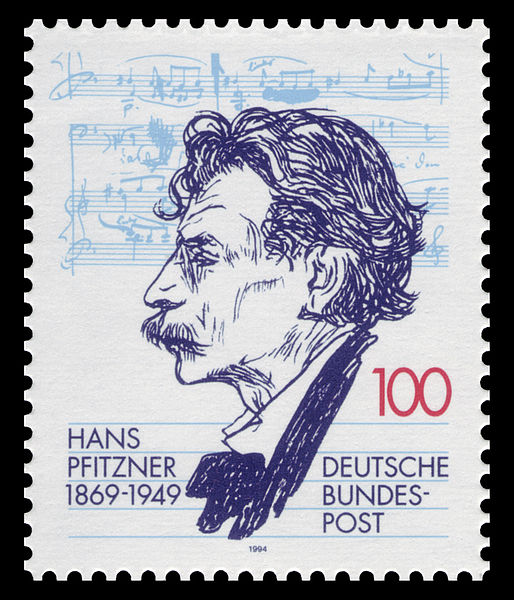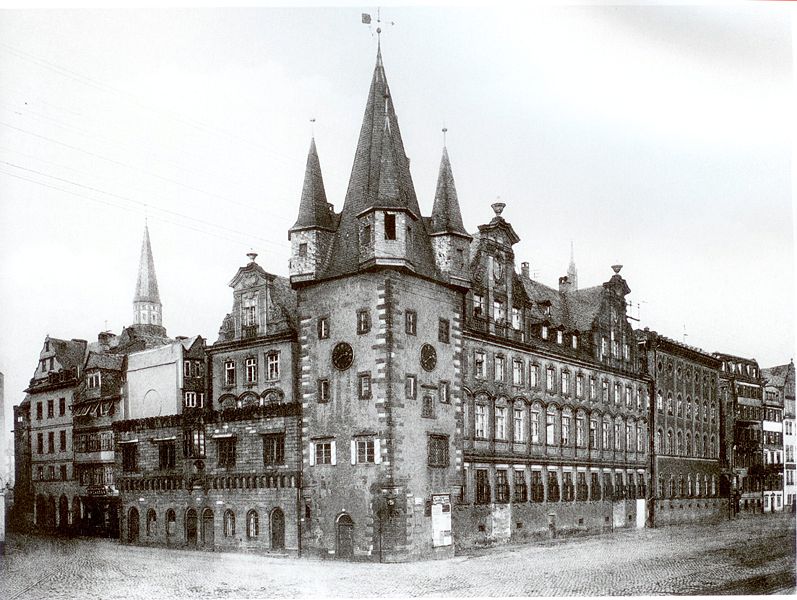<Back to Index>
- Historian Hubert Howe Bancroft, 1832
- Composer Hans Erich Pfitzner, 1869
- Emperor of Japan Uda, 867
PAGE SPONSOR
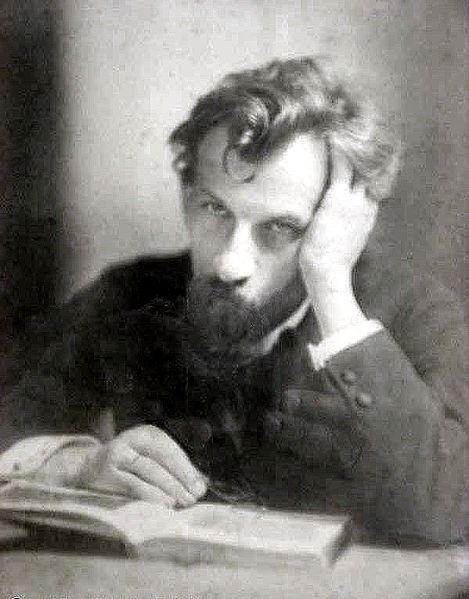
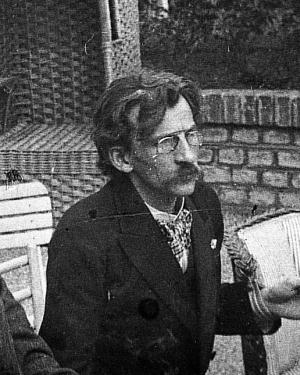
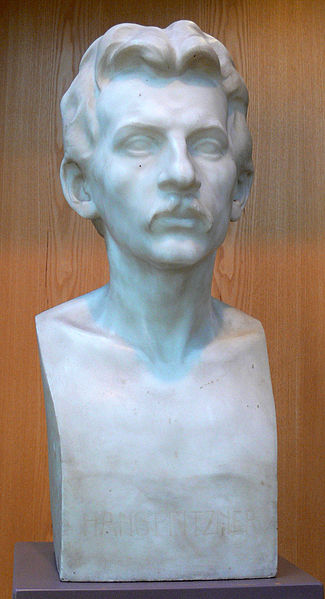
Hans Erich Pfitzner (5 May 1869 – 22 May 1949) was a German composer and self described anti - modernist. His best known work is the post Romantic opera Palestrina, loosely based on the life of the great sixteenth century composer Giovanni Pierluigi da Palestrina.
Pfitzner was born in Moscow, Russia, where his father played violin in a theater orchestra. The family returned to his father's native Frankfurt in 1872 when Pfitzner was two years old, and he always considered Frankfurt his home town. He received early instruction in violin from his father, and his earliest compositions were composed at age 11. In 1884 he wrote his first songs. From 1886 to 1890 he studied composition with Iwan Knorr and piano with James Kwast at the Hoch Conservatory in Frankfurt. (He later married Kwast's daughter Mimi Kwast, a grand - daughter of Ferdinand Hiller, after she had rejected the advances of Percy Grainger.) He taught piano and theory at the Koblenz Conservatory from 1892 to 1893. In 1894 he was appointed conductor at the Stadttheater in Mainz where he worked for a few months. These were all low paying jobs, and Pfitzner was working as Erster (First) Kapellmeister with the Berlin Theater des Westens when he was appointed to a modestly prestigious post of opera director and head of the conservatory in Straßburg (Strasbourg) in 1908, when Pfitzner was almost forty.
In Strasbourg, Pfitzner finally had some professional stability, and it was there he gained significant power to direct his own operas. He viewed control over the stage direction to be his particular domain, and this view was to cause him particular difficulty for the rest of his career. The central event of Pfitzner's life was the annexation of Imperial Alsace - and with it Strasbourg - by France in the aftermath of World War I. Pfitzner lost his livelihood and was left destitute at age 50. This hardened several difficult traits in Pfitzner's personality: an elitism believing he was entitled to sinecures for his contributions to German art and for the hard work of his youth, notorious social awkwardness and a lack of tact, a sincere belief that his music was under - recognized and under - appreciated with a tendency for his sympathizers to form cults around him, a patronizing style with his publishers, and a feeling that he had been personally slighted by Germany's enemies. His bitterness and cultural pessimism deepened in the 1920s with the death of his wife in 1926 and meningitis of his older son Paul, who was committed to institutionalized medical care.
In 1895, Richard Bruno Heydrich sang the title role in the premiere of Hans Pfitzner's first opera, Der arme Heinrich, based on the poem of the same name by Hartmann von Aue. More to the point, Heydrich "saved" the opera. Pfitzner's magnum opus was Palestrina, which had its premiere in Munich on 12 June 1917 under the baton of Jewish conductor Bruno Walter. On the day before he died in February 1962, Walter dictated his last letter, which ended "Despite all the dark experiences of today I am still confident that Palestrina will remain. The work has all the elements of immortality".
Easily the most celebrated of Pfitzner's prose utterances is his pamphlet Futuristengefahr ("Danger of Futurists"), written in response to Ferruccio Busoni's Sketch for a New Aesthetic of Music. "Busoni," Pfitzner complained, "places all his hopes for Western music in the future and understands the present and past as a faltering beginning, as the preparation. But what if it were otherwise? What if we find ourselves presently at a high point, or even that we have already passed beyond it?" Also related is the debate between Pfitzner and Jewish critic Paul Bekker.
Pfitzner dedicated his Violin Concerto in B minor, Op. 34 (1923) to the Australian violinist Alma Moodie. She premiered it in Nuremberg on 4 June 1924, with the composer conducting. Moodie became its
leading exponent, and performed it over 50 times in Germany with
conductors such as Pfitzner, Wilhelm Furtwängler, Hans Knappertsbusch, Hermann Scherchen, Karl Muck, Carl Schuricht, and Fritz Busch. At that time, the Pfitzner concerto was considered the most important
addition to the violin concerto repertoire since the first concerto of Max Bruch, although it is not played by most violinists these days. On one occasion in 1927, conductor Peter Raabe programmed the concerto for public broadcast and performance in Aachen but
did not budget for copying of the sheet music; as a result, the work
was "withdrawn" at the last minute and replaced with the familiar Brahms concerto. Pfitzner's
biographer, Hans Peter Vogel, writes that Pfitzner was the only
composer of the Nazi era who attempted to come to grips with National
Socialism both intellectually and spiritually after 1945. Sabine
Busch, in a comprehensive study, "Hans Pfitzner and National Socialism"
published in 2000 made a long overdue examination of the idealogical
tug - of - war of the composer's involvement with the National Socialists,
based in part on previously unavailable material. She
concludes that, although the composer was not exclusively pro-Nazi nor
purely the anti - Semitic chauvinist as his image often projects, he
engaged with Nazi powers whom he though would promote his music only to
be embittered when the Nazis found the "elitist old master's often
morose music" to be "little propaganda worthy." The most comprehensive
English account of Pfitzner's relations with the Nazis is by Michael
Kater. Increasingly nationalistic in his middle and old age, Pfitzner was at first regarded sympathetically by important figures in the Third Reich, in particular by Hans Frank,
with whom he remained on good terms. But he soon fell out with chief
Nazis, who were unimpressed by his long musical association with the
conductor Bruno Walter, who was Jewish. He incurred extra wrath from the Nazis by refusing to obey the regime's request to provide incidental music to Shakespeare's A Midsummer Night's Dream that could be used in place of the famous score by Felix Mendelssohn,
which was unacceptable to the Nazis because of his Jewish background.
Pfitzner maintained that Mendelssohn's original was far better than
anything he himself could offer as a substitute. Central to the Nazi treatment was a meeting between Pfitzner and Hitler during a hospital as early as 1923, not quite at Pfitzner's own doing. Pfitzner was recovering from a gall bladder operation,
when a mutual friend, Anton Drexler, arranged a visit. Hitler,
unsurprisingly, did most of the talking, and Pfitzner dared to
contradict him regarding homosexual and anti - Semitic thinker Otto Weininger, causing Hitler to leave in a huff. Unbeknownst to Pfitzner, Hitler communicated to Nazi cultural architect Paul Rosenberg that
he wanted "nothing further to do with this Jewish rabbi." Pfitzner
still believed, however, that Hitler was sympathetic to him. When the
Nazis rose in power, Rosenberg recruited Pfitzner (a notoriously bad
speaker) to lecture for the Kampfbund für deutsche Kultur in
1933, and Pfitzner acceded, hoping it would lead him to find a
position. Due to Hitler's edict, however, the composer was passed over
in favor of party hacks for positions as opera Director in Dusseldorf and the generalintendant of the municipal opera in Berlin in spite of deceiving hints from authorities that both positions were being held for him. Moreover,
in the early years of Hitler's rule, Pfitzner received an injunction
from Bavarian Justice Minister Hans Frank and Reich Interior Minister Wilhelm Frick against
traveling to the Salzburg Festival in 1933, where he was to conduct his
violin concerto. Pfiztner had managed to gain a stable conducting
contract from the Munich opera in 1928, but he ran into demeaning
treatment from Hans Knappertsbusch and the intendant Franckenstein. In
1934, he was forced into retirement and lost his positions as opera
conductor, stage director, and academy professor. He was also given an
absurdly low pension of only a few hundred marks a month, which the
composer fought until 1937 when the matter was resolved to Goebbels himself.
Moreover, Pfitzner was rejected as conductor at a Nazi party rally in
1934, with Pfitzner learning for the first time that Hitler thought the
composer to be half Jewish – insinuated by Bayreuth Festival director and Hitler confidante Winifred Wagner.
Pfitzner was forced to prove his racial purity, something intensely
offensive to the legendarily tactless man. By 1939, Pfitzner was
thoroughly disenchanted with the regime. Pfitzner's views on "the Jewish Question"
were both contradictory and illogical, and it is perhaps
best understood that Pfitzner viewed Jewishness as a cultural trait
rather than a racial one. A 1930 statement that caused difficulty for
him in the pension affair was that although Jewry might pose "dangers
to German spiritual life and German Kultur," many Jews had done a lot
for Germany and that anti - Semitism per se was to be condemned. He was willing to make exceptions to blanket anti - Semitism: recommending the performance of Marschner's opera, Der Templer und die Jüdin based on Scott's Ivanhoe,
protecting his Jewish pupil Felix Wolfes of Cologne, with conductor
Furtwängler aiding young conductor Hans Schwieger (who had a
Jewish wife), and maintaining friendships with Bruno Walter and
especially his childhood journalist friend, Paul Cossman, a
"self - loathing" non - practicing Jew who was incarcerated in 1933. His
petitions to help Cossman may have caused the composer to be summoned
and investigated by Gestapo chief Reinhard Heydrich (son of the heldentenor who
had premiered Pfitzner's first opera). It is likely his petitions
contributed to Cossman's release in 1934 (he was eventually re-arrested
in 1942 and died of dysentery in Theresienstadt).
In 1938 Pfitzner quipped in jest that he was afraid to see a celebrated
eye doctor in Munich because "his great - grandmother had once observed a
quarter Jew crossing the street." He worked with Jewish musicians
throughout his career. In the early thirties he often accompanied famed contralto Ottilie Metzger - Lattermann (murdered at Auschwitz)
in recitals and had dedicated his four songs, Op. 19 to her as early as
1905. He had dedicated his songs, Op. 24 to Jewish critic and founder
of a Jewish cultural society Arthur Eloesser in 1909. Still, Pfitzner
maintained close contact with virulent anti - Semites as music critics Walter Abendroth and Victor Junk and was not afraid to use anti - Semitic invective when pursuing his aims. His home having been destroyed in the war and his membership in the Munich Academy of Music having
been revoked for his speaking out against Nazism, Pfitzner was left
mentally ill and homeless, but after the war he was denazified, a
pension was established, performance bans were lifted, and a residence
was procured at an old people's home in Salzburg, Austria, where he died. Wilhelm Furtwängler conducted a performance of Pfitzner's Symphony in C major, at the Salzburg Festival with the Vienna Philharmonic Orchestra in
the summer of 1949, just after the composer's death. Following long
neglect, Pfitzner's music began to reappear in opera houses and concert
halls, as well as recording studios, during the 1990s including a
controversial performance of Palestrina at Lincoln Center in 1997. His own music — including pieces in all the major genres except the symphonic poem — was respected by contemporaries such as Gustav Mahler and Richard Strauss, although neither man cared much for Pfitzner's innately acerbic manner (and Alma Mahler reciprocated his adoration with contempt despite her agreement with his intuitive
musical idealism, a fact evident in her letters to the wife of Alban Berg).
Although Pfitzner's music betrays Wagnerian influences, the composer
was not attracted to Bayreuth, and was personally despised by Cosima Wagner,
in part because Pfitzner sought notice and recognition from such "anti
- Wagnerian" composers as Max Bruch and Johannes Brahms. Pfitzner's
works combine Romantic and Late Romantic elements with extended
thematic development, atmospheric music drama, and the intimacy of
chamber music. Columbia University musicologist
Walter Frisch has described Pfitzner as a "regressive modernist." His
is a highly personal offshoot of the Classical / Romantic tradition as
well as the conservative musical aesthetic and Pfitzner defended his style in his own writings. Particularly notable are Pfitzner's numerous and delicate lieder, influenced by Hugo Wolf, yet with their own rather melancholy charm. Several of them were recorded during the 1930s by the distinguished baritone Gerhard Hüsch, with the composer at the piano. His first symphony - the Symphony in C♯ minor
- underwent a strange genesis: it was not conceived in orchestral terms
at all, but was a reworking of a string quartet. The works betray a
late pious inspiration and although they take on a late Romantic
qualities, they show others associated with the brooding unwieldiness
of a modern idiom. For example, composer Arthur Honegger writes in 1955, after criticizing too much polyphony and overly long orchestral writing in a long essay devoted to Palestrina, Musically,
the work shows a superior design, which demands respect. The themes are
clearly formed, which makes it easy to follow... Pfitzner's
work was appreciated by contemporaries including Richard Strauss and
Gustav Mahler, who explicitly described Pfitzner's second string
quartet of 1902/03 as a masterpiece. Thomas Mann praised Palestrina in
a short essay published in October 1917. He co-founded the Hans
Pfitzner Association for German Music in 1918. Tensions with Mann,
however, developed and the two severed relations by 1926. From the mid 1920's, Pfitzner's music increasingly fell in the shadow of Richard Strauss. His opera, Das Herz of
1932 was unsuccessful. Pfitzner remained a peripheral figure in the
musical life of the Third Reich, and his music was performed less
frequently than in the late days of the Weimar Republic. German critic Hans Heinz Stuckenschmidt,
writing in 1969, viewed Pfitzner's music with extreme ambivalence:
initiated with sharp dissonances and hard linear counterpoint
determined to be taken as (and criticized for being) modernist. This
became a conservative rebellion against all modernist conformity. Composer Wolfgang Rihm commented on the increasing popularity of Pfitzner's work in 1981: Pfitzner is too progressive, not simply, the way Korngold can be taken to be; he is also too conservative, if that means to be influenced by someone like Schoenberg.
All this has audible consequences. We cannot find the brokenness of
today in his work at first glance, but neither the unbroken yesterday.
We find both, that is, none, and all attempts at classification falter.
